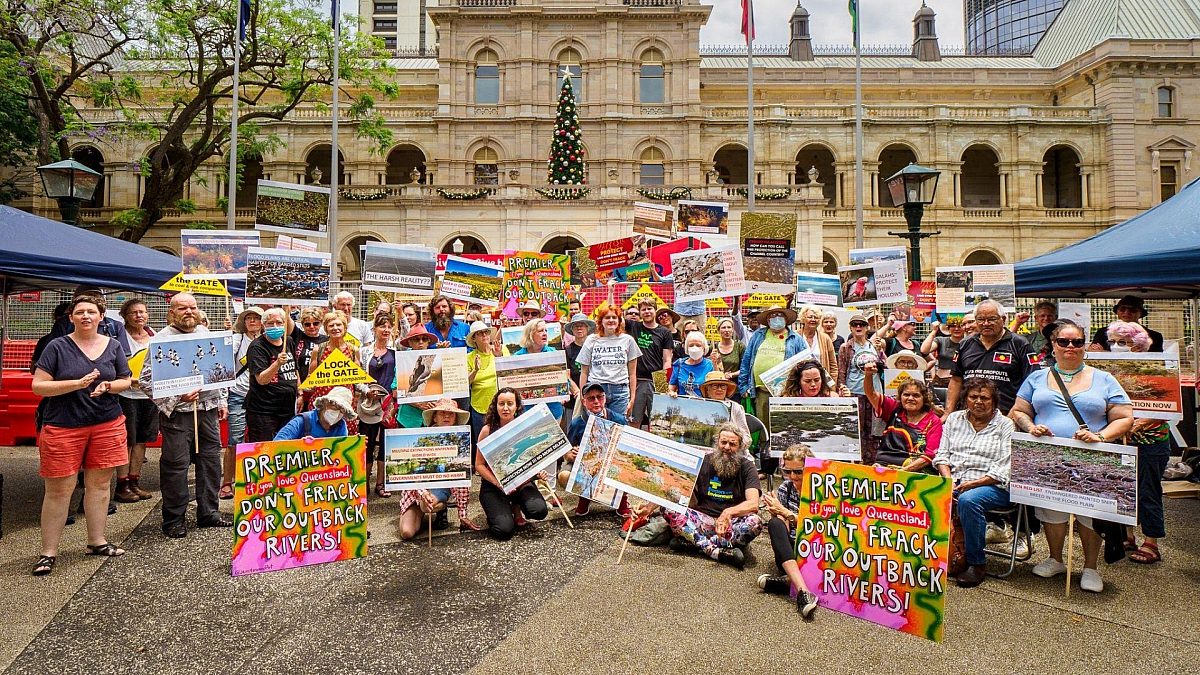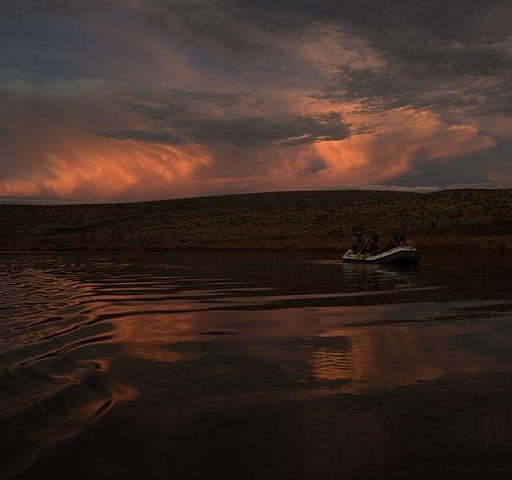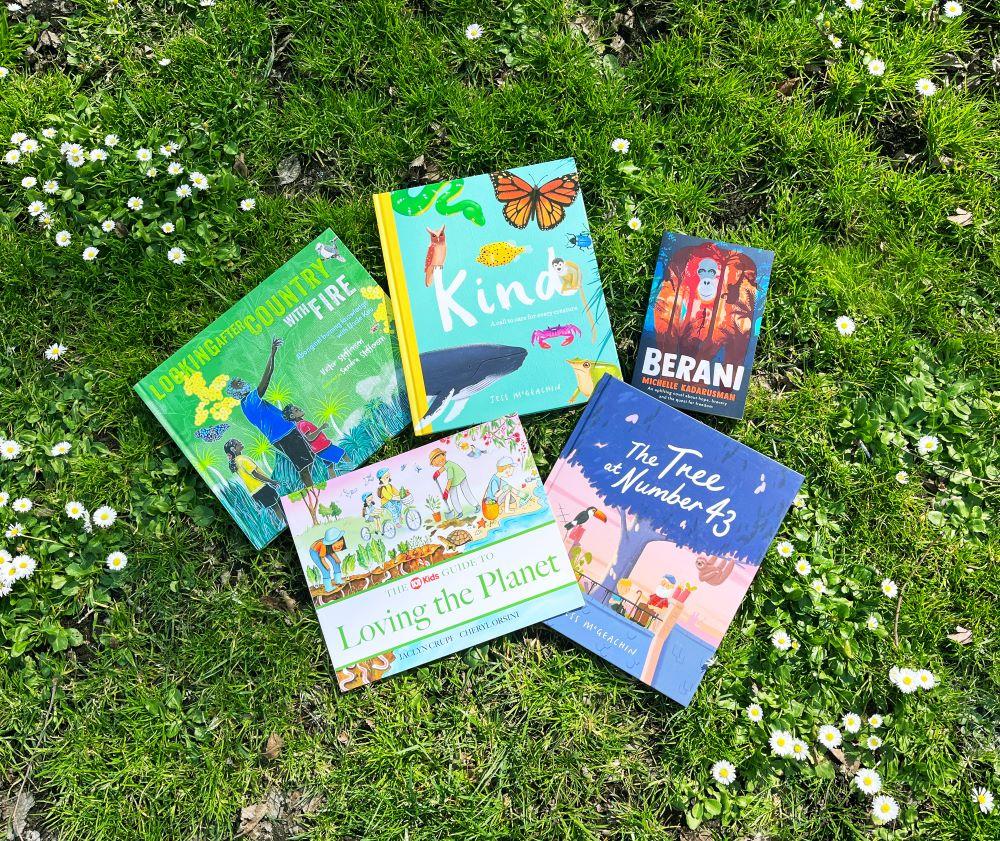Wilderness Journal
Learn about the Martuwarra River Keepers program in issue #026 of Wilderness Journal.

The important work for nature your incredible support has delivered in recent months
We saw a massive groundswell of support for the Channel Country rivers and floodplains in the Lake Eyre Basin; web-based satellite monitoring platform Watch on Nature made big strides; we released a major report exposing deforestation and biodiversity risk for financial institutions; and much more besides!
Backed by people like you, the Wilderness Society commissioned Ernst & Young to develop a new report. It focuses on deforestation and forest degradation, following the sectors that are driving these threats and their links to financial institutions.
In the video below, campaigner Jenita Enevoldsen explains how we’re using the 'Following the money' report to create ongoing engagement with the finance sector to encourage change and urge them to engage in advocacy themselves.
Wilderness Society campaigners launched the report at the Investor Group for Climate Change summit, which was held in Sydney in August.

Thanks to our supporters, investors, superfunds and banks are now reflecting on biodiversity risk in their portfolios. They are developing action plans to de-risk their investments and ensuring they are not contributing to deforestation in Australia.


Our organisation is proud to be the inaugural partner of the The Martuwarra Fitzroy River Council’s River Keepers program, which officially launched in May 2023, and is planned to run over a three year period. The River Keepers are based along the Martuwarra (Fitzroy River) on Nyikina Country, 60 kilometres south of Derby in the Kimberley.
The program supports 12 River Keepers involving Elders and young Indigenous leaders from the communities of Yurmulun (Pandanus Park) and Balginjirr to work on Country to map the Traditional Ecological Knowledge (TEK)─the environment, cultural and spiritual knowledge─of Martuwarra / Fitzroy River the National Heritage-listed river.
The Martuwarra River Keepers program is based on the principles of: Indigenous science, cultural capital and the conservation economy─focused on restoration and healing, not extraction.
The overarching goals of the program are to: support the professional development of the river keepers to implement components of the Martuwarra Fitzroy River Council’s Conservation and Management Plan, and research and generate three sustainable, regenerative economic initiatives.
The vision of this program is that these regional Indigenous led cultural conservation and tourism initiatives will enshrine the cultural and ecosystem value of water and provide sustainable livelihoods for local Indigenous people. As part of capacity building of the river keepers, during August and September they undertook media training course to empower them to tell their own stories of Martuwarra.

Learn about the Martuwarra River Keepers program in issue #026 of Wilderness Journal.
Thanks to your generous donations, web-based satellite monitoring platform Watch on Nature continues to be a tool for change—utilised by groups across the environment movement to uncover deforestation as it happens and hold perpetrators to account.
In October, Wilderness Society was invited to present Watch on Nature at Google’s annual Geo for Good summit at its headquarters in Silicon Valley! ENGOs, universities and research labs and some of the biggest geospatial brains from across the world shared the latest advances, ideas and research in geospatial science, new satellite tech and monitoring systems—including our very own GIS Analysts, Rach and Ola!
“We demonstrated how Watch on Nature works and spoke about the deforestation crisis unfolding in Australia, and had folks from all over the world interested in collaborating with us in future,” says Ola. “The sit-down sessions with Google Earth professionals were incredibly valuable, because we got to discuss how to make the platform even more powerful and impactful for nature.”
Watch on Nature takes on deforestation in the NT!
In September, a major NT cotton station was fined for unlawful clearing first exposed by Watch on Nature. Concerned individuals at the Environmental Centre of the Northern Territory (ECNT) and Territory Rivers Alliance were able to detect the destruction on Tarwoo station using Watch on Nature, when four hectares of bushland was razed to the ground without a permit in late 2021.

Also in September, your support enabled four Wilderness Society staff to attend the Northern Territory State of the Environment Conference to discuss how Watch on Nature is being used. Whilst on the panel, Wilderness Society offered the tool to Traditional Owners and other First Nations groups who may have an interest in monitoring Country remotely for deforestation, mine exploration, fire etc.
Watch on Nature won an award!
We’re thrilled to report that the platform you helped us build won a 2023 Australian Good Design Award (Social Impact category) for Excellence in Design and Innovation! The jury said: “The intersection of macro impact, grassroots involvement and technology makes Watch on Nature a very strong proposition. It’s powerful enough to ensure decision-makers acknowledge the issue and create change, yet also addresses the individual barrier of, “I’m too small to make an impact”. We would happily call Watch On Nature a triple 'top-line' project involving People, Planet and Purpose.” We hope you feel as proud about this as we do!
Watch on Nature is being upgraded!
Watch on Nature is part-way through an exciting 13-week upgrade! We’re implementing user feedback and streamlining processes to improve the performance of the platform. It’s all thanks to your support that we’re able to continue to refine and enhance this important tool.

Over the past few months, you’ve helped create a massive groundswell of support for the Channel Country rivers and floodplains in the Lake Eyre Basin—some of the last free-flowing desert rivers left on Earth. Thanks to you, the message to the Queensland government has been delivered loud and clear: there’s no place in this precious ecosystem for oil and gas.
The Queensland government's consultation period on the future of the Channel Country rivers and floodplains closed in August. Across the movement, in Queensland and beyond, you helped generate over 22,000 submissions on the need to expand protections and ban oil and gas on these sensitive floodplains! This included personalised submissions made on the ground via our volunteer teams, directly into the Queensland government's survey portal—efforts that would not have been possible without your support.
We marked this milestone with an interview on ABC Western QLD, highlighting the record-high submissions made on the need to protect the globally significant Channel Country rivers and floodplains. Genuine community consultation is essential to making sure all communities are given a fair say in environmental decision-making (learn more about that here).
Thank you for helping us get this far; now it's time to really drive this win home. Together, we can ensure the Queensland government protects the Channel Country—for the incredible wildlife, rich cultural connections and the regional communities that rely on these life-giving waters.

Lutruwita / Tasmania is home to some of the most climate critical and stunning forests in the world. However, these forests are threatened by industrial scale native forest logging, by the state owned logging agency Forestry Tasmania.
“Citizen scientists are going out every week to document high conservation values of threatened forests such as large hollow bearing trees,” says campaigner Alice Hardinge. “Since April, over 30 volunteers have been trained up and have completed comprehensive surveys of 10 forested areas—walking hundreds of kilometres off track and discovering seven new giant trees, creating 21.7 hectares of reserves.
“Survey reports have been submitted to the relevant regulator as well as the natural values atlas. Forestry Tasmania says that it doesn't log giant trees. Yet every other week, Tasmanians see giant single-log loads on the back of trucks, and concerned citizens find giant stumps in public state forests.”
As a result of survey evidence gathered, criminal proceedings were initiated against Forestry Tasmania by Wilderness Society Tasmania in July. This is the first ever private criminal prosecution of Forestry Tasmania.

For the past 29 years, Wilderness Society has celebrated books that foster a love of nature in children through our annual Environment Awards for Children’s Literature—because we believe the books we read as children help shape us as people. And as supporters like you know, now more than ever, we need to be a society that respects and protects its unique wildlife and ecosystems.
Two years ago, with your support, we added a second award to honour First Nations storytelling: the Karajia Award for Children’s Literature. This year, 21 books were shortlisted across both Awards and the judging panels—which consisted of Adam Goodes, Leanne Mulgo Watson, Hunter Page-Lochard for the Karajia Award as well as Alex Papps, Sami Bayly and Adam Duncan—had a tough job picking these winners!

Karajia Award for Children’s Literature: Looking after Country with Fire by Victor Steffensen, illustrated by Sandra Steffensen, published by Hardie Grant Explore
Environment Award for Children’s Literature
Non-fiction: The ABC Guide to Loving the Planet by Jaclyn Crupi, illustrated by Cheryl Orsini, published by ABC Books an imprint of Harper Collins
Picture fiction (co-winners): Kind by Jess McGeachin, published by Allen & Unwin, and The Tree at Number 43 by Jess McGeachin, published by Penguin Random House Australia
Fiction: Berani by Michelle Kadarusman, published by Allen & Unwin
If you’re interested in owning (or gifting!) any of these titles, Gleebooks is donating 10% of sales of the shortlisted books back to us!

And for the third year in a row we presented Nature Book Week: an all-ages program of exciting nature-themed storytelling events taking place in libraries, parks, schools, bookstores and online. This year, it was bigger and better than ever, with events all across Australia!
To learn more or keep in the loop about next year's program, please fill out the form at naturebookweek.com.